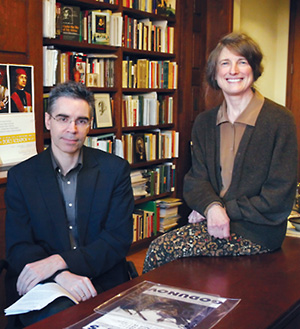Princeton University
Princeton Weekly Bulletin March 5, 2007, Vol. 96, No. 18 prev next current
- Page One
- • Creative Connections: ‘Godunov’ project driven by scholarly, artistic collaborations
- • Alumni award winners stress value of public service
- Inside
- • Top students honored with highest awards
- • From dissertations to collaborations
- • University and borough team up to address pedestrian safety
- People
- • Hammond joins facilities senior management team
- • Lawson, Martinez named to enhance diversity initiatives
- • Spotlight
- Almanac
- • Calendar of events
- • Nassau notes
- • By the numbers
- The Bulletin is published weekly during the academic year, except during University breaks and exam weeks, by the Office of Communications. Second class postage paid at Princeton. Postmaster: Send address changes to Princeton Weekly Bulletin, Office of Communications, Princeton University, 22 Chambers St., Suite 201, Princeton, NJ 08542. Permission is given to adapt, reprint or excerpt material from the Bulletin for use in other media.
- Subscriptions. The Bulletin is distributed free to faculty, staff and students. Others may subscribe to the Bulletin for $30 for the 2006-07 academic year (half price for current Princeton parents and people over 65). Send a check to Office of Communications, Princeton University, 22 Chambers St., Suite 201, Princeton, NJ 08542.
- Deadlines. In general, the copy deadline for each issue is the Friday 10 days in advance of the Monday cover date. The deadline for the Bulletin that covers March 26-April 1 is Friday, March 16. A complete publication schedule is available at www.princeton.edu/ pr/ pwb/ deadlines.html; or by calling (609) 258-3601.
- Editor: Ruth Stevens Calendar editor: Shani Hilton Staff writers: Jennifer Greenstein Altmann, Eric Quiñones Contributing writers: Ushma Patel Photographers: Denise Applewhite, John Jameson Design: Maggie Westergaard Web edition: Mahlon Lovett
From dissertations to collaborations
Princeton NJ — When Caryl Emerson was a graduate student at the University of Texas-Austin in the late ‘70s, she spent her days and nights studying an 1825 play by Alexander Pushkin called “Boris Godunov,” the subject of her dissertation.
Emerson went on to become the A. Watson Armour III University Professor of Slavic Languages and Literatures at Princeton, concentrating on 19th-century Russian prose and the Russian critical tradition, but she never put aside her fascination with “Boris Godunov.”

Princeton scholars Simon Morrison and Caryl Emerson are managing the “Godunov” world premiere project. (photo: Denise Applewhite)
“It’s a very complicated play,” said Emerson. “I’ve not stopped thinking about it for 25 years.”
Now Emerson is a leading force in bringing Pushkin’s play to the stage as it was meant to be seen in a grand 1936 production that went unrealized. Emerson and Associate Professor of Music Simon Morrison are jointly managing the ambitious project to stage a world premiere of “Boris Godunov” at Princeton.
The historical drama was set to be performed in Soviet Russia with a magnificent score by legendary Russian composer Sergei Prokofiev and direction by Vsevolod Meyerhold, an innovator in the theater, but the politics of the Soviet era prevented the play from being staged.
For Morrison, an expert on Prokofiev and his music, this is the second major work by the composer he has launched at Princeton. In 2005 he was the force behind the performance of “Pas d’Acier,” one of the great lost ballets of the 20th century.
Morrison was drawn to the score for “Boris Godunov” because of the eerily appealing music and the poignancy of its never being realized as Prokofiev intended.
“It’s a wasted score from the most productive and provocative period of his career,” Morrison said. “But the music needs the play to be understood. It’s built to wrap around the words, to amplify the literary themes of loneliness and alienation.”
The two professors have known each other since Morrison was a graduate student at Princeton. When he received his Ph.D. in 1997, Emerson was one of his dissertation advisers. As colleagues, they developed a close working relationship, since much of Morrison’s work centers on Russian and Soviet music.
As co-project managers, the two have collaborated to explain the beauty of the play and the music. Emerson has articulated the play’s symbolism and historical plot; Morrison has elucidated the significance and appeal of the score.
“To succeed, the project absolutely demands a Pushkin expert,” Morrison said, “because Pushkin’s text is quite experimental, an affront to theatrical convention.”
Emerson is beyond thrilled to be involved in the project. “This is everybody’s academic fantasy: What you care about when you’re sitting alone in the library becomes what everybody else cares about,” she said.
And even though she has studied and written about the play for the last 25 years — this year she co-wrote “The Uncensored Boris Godunov: The Case for Pushkin’s Original Comedy” with Chester Dunning — this production has still taught her new things about the play.
“A great text never stops teaching you,” Emerson said. “I reread it and see things I never saw before. A great work of art is like a diamond. It has a lot of facets and you can’t take them all in at once. And it never loses its luster.”
Related article in this issue...
See also By the numbers in this issue...

